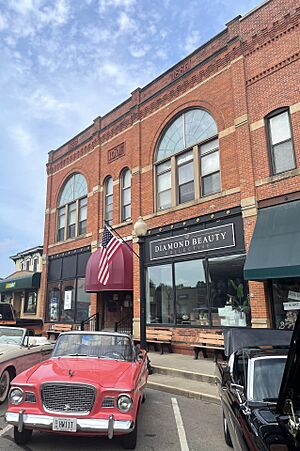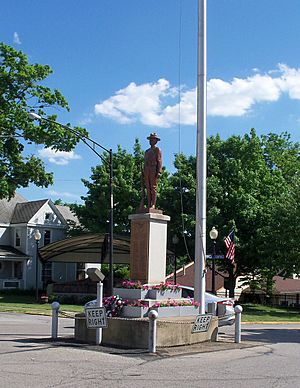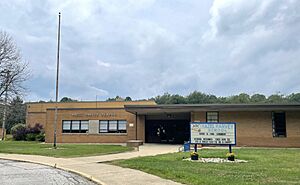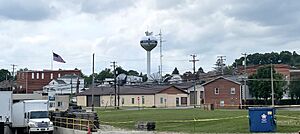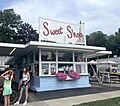Doylestown, Ohio facts for kids
Quick facts for kids
Doylestown, Ohio
|
|
|---|---|
|
Village
|
|
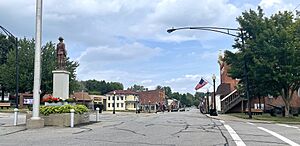
Uptown Doylestown
|
|
| Motto(s):
"Village Of Values A Town Of Tradition"
|
|
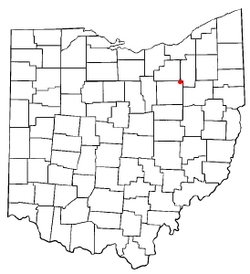
Location of Doylestown, Ohio
|
|
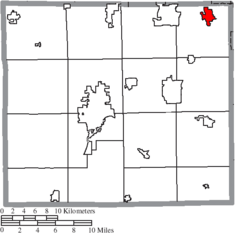
Location of Doylestown in Wayne County
|
|
| Country | United States |
| State | Ohio |
| County | Wayne |
| Area | |
| • Total | 1.86 sq mi (4.82 km2) |
| • Land | 1.86 sq mi (4.82 km2) |
| • Water | 0.00 sq mi (0.00 km2) |
| Elevation | 1,240 ft (380 m) |
| Population
(2020)
|
|
| • Total | 3,051 |
| • Estimate
(2023)
|
3,053 |
| • Density | 1,640.32/sq mi (633.18/km2) |
| Time zone | UTC-5 (Eastern (EST)) |
| • Summer (DST) | UTC-4 (EDT) |
| ZIP code |
44230
|
| Area code(s) | 330 |
| FIPS code | 39-22568 |
| GNIS feature ID | 2398747 |
| Website | http://www.doylestown.com/ |
Doylestown is a small village in Ohio, United States. It sits on the highest point in Wayne County. The village is surrounded by Chippewa Township and is about 13 kilometers (8 miles) southwest of Akron. William Doyle founded Doylestown in 1827. He planned a town with 40 lots on a hilltop where two Native American trails met. In 2020, about 3,051 people lived there.
Contents
History of Doylestown
Early Settlers and Founding
The first settler in the Doylestown area was Thomas Frederick. He arrived in 1813 from Lancaster, Pennsylvania. In 1827, William Doyle bought 50 acres of land from Frederick and other early settlers. Doyle moved his family there, planning to start a new village. Five of Doyle's friends from Pennsylvania also moved their families to help settle the new town.
On December 9, 1827, Charles Christmas, one of Doyle's friends, surveyed the village. The survey was officially recorded on Christmas Day. The new village had 40 lots in what is now called Uptown. Soon after, Doyle and another family built Doylestown's first building, a log cabin tavern.
In 1836, Doylestown started its first Board of Education. They bought land to build a school. Ten years later, the wooden school was replaced with a brick building. This building grew taller as the village expanded in the 1850s.
Many early buildings in Doylestown were made of brick. In 1834, Abrahamm Franks started making bricks. He built a kiln near the village. Other temporary brickyards were set up as needed. Longer-lasting brickyards were built in 1867, 1872, and 1886.
Besides brickmaking, other early businesses included mills for grain and wool. There was also a tannery and a distillery. But the most important early industry was coal mining, which started to grow in the 1840s.
Coal Mining and Industry Boom
A valley southeast of the village, first called Nibrara, then Pleasant Valley, was settled by Samuel Chidester. People there used local coal for their own needs. In 1840, David Galehouse opened a commercial coal mine. This changed "Pleasant Valley" into "Rogues' Hollow." It became the first major industrial area in eastern Wayne County.
More mines opened in the hollow. The area became busy with men working in the mines. Between 1840 and 1940, at least 102 mines operated there.
As the mines attracted many new people, other businesses grew in Doylestown. In 1860, John Seiberling built a factory to make mowing machines. His company, Excelsior Mowers and Droppers, started in 1861. The factory was updated in 1887. Workers from the coal mines, whose production was slowing down, helped the factory grow.
Doylestown in the 20th Century
By 1896, Doylestown's population was over 1,000 people. The coal mines became less profitable around 1900. The mower factory also faced problems after a fire in 1901. But by then, Doylestown was a well-established village. Some new industries, like aluminum product companies, started in the 1890s and 1900s.
In 1909, the village needed a bigger school. The old 1884 building was taken down. A new school was built on High Street. It had special safety features because of a school fire in nearby Cleveland in 1908.
Industry returned to Doylestown in the mid-1900s. Midwest Container Co. started in 1946. This company has made various plastic products since then. Today, it is known as Mid-West Poly Pak, Inc. Building and farming also remained important jobs in Doylestown throughout the 20th century.
Doylestown Today
Today, Doylestown is less industrial and agricultural. It has become more of a "bedroom community." This means many people who live in Doylestown travel to larger cities like Akron or Cleveland for work. Most of the village is now residential, with some areas still used for farming.
Geography of Doylestown
Doylestown covers about 4.82 square kilometers (1.86 square miles) of land. It is located on top of a hill. Most of the town, including the main area, is about 381 meters (1,250 feet) above sea level.
Small streams start from springs on the hill's slopes. They flow down into larger creeks around the village. Silver Creek drains the east side of town. Mill Creek drains the north and west. Chippewa Creek drains the south side and collects both Mill and Silver Creeks. Where Silver Creek flows into Chippewa Creek, the elevation is 290 meters (950 feet).
The town is in the far northeastern part of Wayne County. Doylestown's center is about 1.6 kilometers (1 mile) south of the Medina and Summit County lines. It is also about 3.2 kilometers (2 miles) from the Summit County line to the east. Nearby cities in Summit County include Norton, Barberton, and New Franklin.
Ohio State Route 585 runs along the northern and eastern edges of the village. It goes southeast from Norton to Wooster. Ohio State Route 21 runs north–south about 1.6 kilometers (1 mile) east of the village.
Population Facts
| Historical population | |||
|---|---|---|---|
| Census | Pop. | %± | |
| 1870 | 551 | — | |
| 1880 | 1,040 | 88.7% | |
| 1890 | 1,131 | 8.8% | |
| 1900 | 1,057 | −6.5% | |
| 1910 | 877 | −17.0% | |
| 1920 | 1,037 | 18.2% | |
| 1930 | 1,150 | 10.9% | |
| 1940 | 1,259 | 9.5% | |
| 1950 | 1,358 | 7.9% | |
| 1960 | 1,873 | 37.9% | |
| 1970 | 2,373 | 26.7% | |
| 1980 | 2,493 | 5.1% | |
| 1990 | 2,668 | 7.0% | |
| 2000 | 2,799 | 4.9% | |
| 2010 | 3,051 | 9.0% | |
| 2020 | 3,051 | 0.0% | |
| 2023 (est.) | 3,053 | 0.1% | |
| U.S. Decennial Census | |||
Population in 2010
In 2010, Doylestown had 3,051 people living in 1,206 households. About 827 of these were families. The village had about 633 people per square kilometer (1,640 people per square mile). There were 1,292 homes in total.
Most of the people in Doylestown were White (97.9%). A small number were African American (0.6%), Native American (0.1%), or Asian (0.2%). About 1.4% of the population was Hispanic or Latino.
About 31.9% of households had children under 18. Most households (53.1%) were married couples. About 11.4% had a female head of household with no husband. About 4.1% had a male head of household with no wife.
The average age in the village was 41.6 years. About 24.8% of residents were under 18. About 18.8% were 65 years or older. There were slightly more females (53.7%) than males (46.3%).
Education
Doylestown has a branch of the Wayne County Public Library. This library helps students and residents with their learning needs.
Images for kids
See also
 In Spanish: Doylestown (Ohio) para niños
In Spanish: Doylestown (Ohio) para niños
 | Selma Burke |
 | Pauline Powell Burns |
 | Frederick J. Brown |
 | Robert Blackburn |


